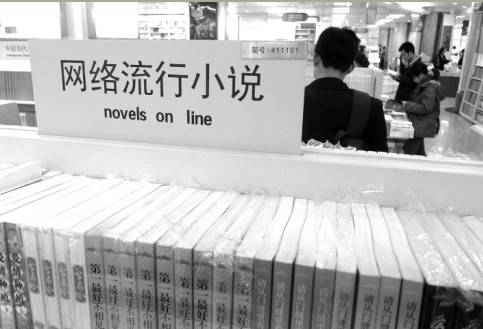LIU XIAOYUAN: Criticism has role to play in fostering online classics

Online literary works sold in a book store
In China, 284.67 million people read online literature, and most of them are younger than 30, according to data released in May last year. Online literature is not only altering traditional Chinese literary concepts but also shaping the values and aesthetics of teenagers. But, because online literature is a relatively new and spontaneous phenomenon, some works in this category still possess serious shortcomings and are often derided as “trash fiction.”
Online literature has become a focal issue in society. Academics and authorities are calling for online literature to produce quality stories that are worthy of being called classics.
However, the two sides have different expectations for online literature. The expectations of the literary circle are mainly based on traditional literary classics. They hope online literary works will transcend the era and ponder issues related to the destiny of mankind while reflecting on the confusion and anxiety in contemporary China. They do not care much about the entertainment value of and potential economic gains from online literature.
The motives of the literary circle are purely lofty. But as a new literary form based on the platform of network media and distinct from any other existing literary forms, online literature has its own style of writing. If they do not realize this, critics will inevitably not be able to form a close connection with the object of criticism, and they will find it hard to convince online readers and writers to accept their critiques. Without literary criticism, the development of online literature will be rudderless.
However, mainstream critics are exploring this relationship. Some are willing to abandon an elitist outlook and take this literary form seriously. They seek to become more engaged with writers and readers to write objective commentary. But as a whole, traditional literary critics are still disconnected from the online literary community.
Authorities also play a role in guiding online literature by implementing regulatory policies and measures. The difference between them and literary critics is that the highest standard for authorities is public recognition and approval. The government prioritizes education through entertainment and economic returns.
As Chinese President Xi Jinping stressed in his talks at the Beijing Forum on Literature and Art in October 2014, a good work should integrate social and economic effects, while prioritizing the social dimension. Literature and art cannot become slaves of the market, and must not be stained with the stink of money. Excellent literature and art, at best, can gain ideological and artistic successes and can be embraced by the market.
This kind of guidance is based on the reality of online literature, and it is specific. Therefore, it can be easily accepted by Internet users and is also conducive to online literature.
In fact, though online literature now has its problems, falling short of the expectations from both academia and the government, its development direction is in accordance with the expectations. In addition to guidance in direction and spirit, understanding and support are important ways to foster online classics, especially a respect for the characteristics of this distinct literary form and the feelings and demands of its readers and writers.
Online literature originates from the grassroots, and its first task is to serve the spiritual demands of the people. Also it mostly reflects confusion, anxiety, aspiration and desires of the people and also of the era. We should be aware that many online writers are shouldering the responsibility of guiding the readers’ values, promoting social justice and criticizing unhealthy tendencies in society.
The article was translated from the Guangming Daily. Liu Xiaoyuan is from the Department of Chinese Language and Literature at Fudan University.

 PRINT
PRINT CLOSE
CLOSE